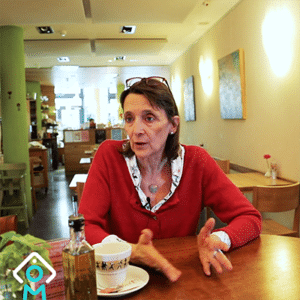The day-to-day of a neighborhood shop
In this Meet an Entrepreneur video, Mayline Roux, co-founder of “Au pain de Mary” explains what her day-to-day life as an entrepreneur looks like:
- Seasonality of sales
- Good days and bad days
- Adding to neighborhood life
- Standing out from the competition
- Traditional or modern products
- An “essential” shop
Mayline Roux is the co-founder of “Au pain de Mary”. Learn more about her on aupaindemary.lu.
You liked this content?Share it now!
Bookworm? Read the transcript!
Transcription de l'intervention de Maryline Roux
In a neighborhood, being open on Sundays livens things up some. That’s why I find little neighborhood shops very important.
The day-to-day of a neighborhood shop
Maryline Roux, co-founder of AU PAIN DE MARY since 2013
Seasonality of sales
There’s always one day in the week that’s quieter, for sure… Before, it was pretty much always the same day. Now, you could say it’s very random. Friday, Saturday and Sunday are three days where we have a lot more people in. It’s the same thing with timing. Let’s say on weekends, it’s definitely more in the morning than in the afternoon.
Good days and bad days
There are good days where we’re pleased, because all in all, everything from the breads to the pastries turn out how we want them to. Then you have days where things are harder, because the bread, the pastries and such are living products. A lot comes into play when you’re making those products… It’s not just who makes them, it’s the weather, the humidity… Everything plays a part in it. So, some days, it’s perfect, it’s how you want it. Other days, it’s not as good, so you’re a bit disappointed. So you try to figure out why … It’s not easy every day, that’s for sure.
Adding to neighborhood life
In a neighborhood, being open on Sundays livens things up some. That’s why I find little neighborhood shops very important. We need to do what we can to keep them because they bring a neighborhood to life. A neighborhood with no shops at all is dead.
Standing out from the competition
A lot of times, when it’s a “bakery and pastry” shop, you get bakery pastries. We still wanted to have more refined pastries, even if we have a bakery section. We make lots of things: everything that’s “petits fours”, chocolates, chocolate bars, jams, other spreads… We do have a lot of products… Our store is actually a bit too small.
Traditional or modern products
First come the baguettes, then, for the other breads it would be… We sell a lot of buckwheat and rye, now the small spelt too because there are a lot of people who want to avoid gluten. The special desserts sell well, but what I’ve noticed, especially with our French clientele, are the traditional pastries: the Saint-Honoré, the Paris-Brest, the fraisier, the millefeuille…
An “essential” shop
As soon as it all started, we started wearing face masks, we used disinfectants. At the beginning, we did have quite a drop in income because we used to deliver to restaurants a lot, and to banks, for breakfasts and whatnot. So it was hard for two or three months because we ended up with about half of the staff. There were all the apprentices who weren’t allowed to come to work. Saleswomen with kids who had to stay home. Or husbands who had to stay at home… What helped a little was that lots of people wanted delivery, who didn’t want to come in. So Manu and I would take our little car in the evening and go out on delivery after work. For the most part, people were very understanding. They thanked us a lot for staying open even. That too gave us courage, because it really wasn’t easy. The fear was always there since we were around people all the time. We prayed every day that no one would get sick, because in the staff, it would have been a hassle, and for us too, because if Manu or I had caught it, we would have had to close down.




